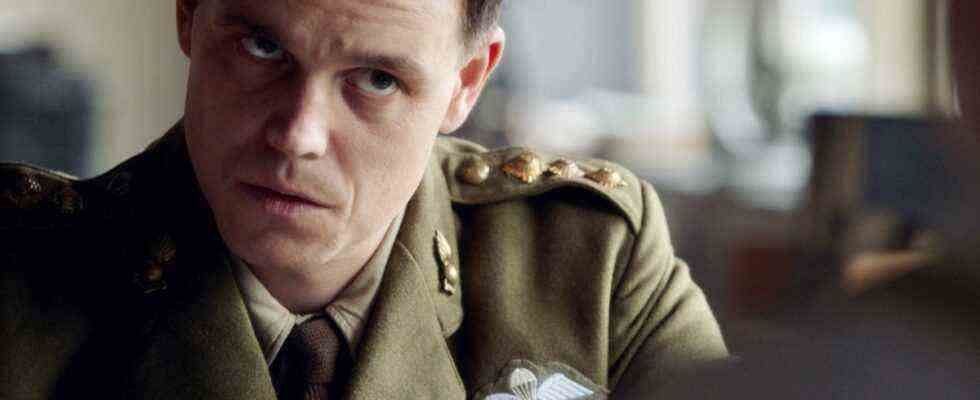They are oppressive scenes. Soldiers surround a barn, pull out a ragged man, the officer puts a revolver in his mouth. They rip his clothes off and the officer looks on without emotion as his soldiers beat the arrested man with ax handles, only then does he order them to stop: The man should live for his trial.
This man is not Franz Lang, as he claims, but Rudolf Höss, the former commandant of the German death camp in Auschwitz, who killed more than two million people and was tracked down by a British special unit in 1946. The scene is probably authentic. And the officer really did exist: Hanns Alexander.
The ARD docudrama “Nazi Hunters” is about the short phase in which the victorious powers were still intensively searching for Nazi criminals. The War Crimes Investigation Unit, in which some Jewish Germans like Hanns Alexander also work, is the focus at first. Among the strongest scenes are their debates about where the limits of retribution lie. Hanns Alexander was one of the liberators of the Bergen-Belsen concentration camp, and the horror he saw there haunts him. He must enforce the law and yet has revenge in his heart. His opponent in the unit, Captain Anton Walter Freud, Sigmund Freud’s grandson who escaped to London in 1938, has his way: We mustn’t become like them, he says.
The Cold War, which soon followed, let the urge to search in the western sectors cool down, and the Federal Republic of Germany only slowly began to bring perpetrators to justice in the late 1950s. The situation was reversed in East Germany: interest in the initially rigorous criminal justice system rapidly diminished soon after the founding of the GDR, because Nazi crimes were declared an exclusive problem for the Federal Republic. Only in the present, as is currently the case in the trial of a 100-year-old secretary, is the judiciary starting from the principle: Anyone who worked without coercion in an institution that was specially created for murder and terror cannot claim to have been involved in these murders having had nothing to do: he or she was involved.
Although the docudrama holds back, the deeds are hard to bear
If this principle had only applied to the personnel involved in the Holocaust in the first decades after the war, the Federal Republic would have had to conduct tens of thousands more proceedings – which were never conducted. And even the British investigators in this film almost despair: for every prominent murderer they arrest, there are hundreds of his helpers and accomplices; but the British military administration does not want to conduct so many procedures.
Nevertheless, the successes of the War Crimes Investigation Unit in 1945/46 are remarkable, and “Nazi Hunters” illustrates this story as drastically as it is intensively: In addition to Höß, those caught include Bruno Tesch, managing director of the company that produced the poison gas for the genocide, the camp commandant of Bergen-Besen, Josef Kramer, and the SS doctor Alfred Trzebinski, who conducted horrific tuberculosis experiments on Bullenhuser Damm in Hamburg with Jewish children from Auschwitz and had them all murdered. Although the docudrama is still holding back, the deeds that it doesn’t want to show too drastically and yet has to show are hard to bear. The conversations with two eyewitnesses from Italy, the sisters Andrea and Tatiana Bucci, are moving. They were deported Jewish children in Auschwitz and had to watch their little cousin Sergio being picked up – he came to Bullenhuser Damm and never came back.
One notices the passion of the director Raymond Ley for his subject in the film, his docudrama is definitely worth seeing. Despite one weakness: “Nazi Hunters” wants to show too much at once, namely the daily confrontation of investigators with the darkest part of people – and at the same time the tragedy of the children from Bullenhuser Damm. As a result, the War Crimes Unit remains too pale, too little told, despite the title. At some point she suddenly disappears from the film, along with the captured ones, by the way.
Without the British peculiarity, they might have escaped justice via the “rat line” of fugitive SS men that led to South America. Even if not, it cannot be ruled out that some of them – like so many others – would have enjoyed pardons and mild sentences if they had been caught a few years later. Those arrested in this drama were not so lucky: almost all of them were sentenced to death and executed in Hamelin in 1946. Höss was hanged in Poland in 1947.
Nazi Hunters – Journey into Darkness, Sunday, 9:45 p.m., The First.

